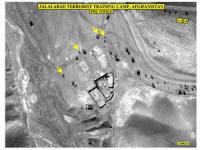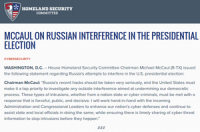-
How are conspiracy theories adopted, and what are their risks?
Why do people adopt conspiracy theories, how are they communicated, and what are their risks? A new report examines these questions, drawing on research in psychology, information engineering, political science, and sociology.
-
-
Russia is targeting Europe’s elections. So are far-right copycats.
Less than two weeks before pivotal elections for the European Parliament, a constellation of websites and social media accounts linked to Russia or far-right groups is spreading disinformation, encouraging discord and amplifying distrust in the centrist parties that have governed for decades. Matt Apuzzo and Adam Satariano write in the New York Times that the activity offers fresh evidence that despite indictments, expulsions and recriminations, Russia remains undeterred in its campaign to widen political divisions and weaken Western institutions. “The goal here is bigger than any one election,” said Daniel Jones, a former F.B.I. analyst and Senate investigator. “It is to constantly divide, increase distrust and undermine our faith in institutions and democracy itself. They’re working to destroy everything that was built post-World War II.”
-
-
Iran officially begins unlimited production of enriched uranium, heavy water
Iran has officially ended its compliance with several commitments under the 2015 nuclear accord, an informed official in the country’s atomic energy body told local media channels on Wednesday.
-
-
New research on immigration, terrorism, and ideology
In the 43 years between 1975 and 2017, terrorists — foreign-born, native-born, and unknown – killed 3,518 Americans on U.S. soil (this includes the 9/11 attacks). During the same period, about 800,000 Americans were killed in homicides. Overall, the chance of being murdered by a foreign-born terrorist between 1975 and 2017 was about 1 in 3.8 million per year. The author of a new report says that the main lesson from the report is that there are very few terrorists of any ideology or origin who pose a threat to Americans on U.S. soil, and even fewer who manage to murder Americans. “The ideology, frequency, deadliness, and origins of terrorists are fascinating,” the author says, but these numbers are so small that it is difficult “to be overwhelmed by fear.”
-
-
The author of “World War Z” is worried about germ warfare
What if Zika had been cooked up in a lab? Max Brooks, the author of World War Z, writes in Slate that in 2016, he asked that question in an op-ed for the New York Daily News. At the time, Zika was spreading across the country, and Congress seemed to be treating it like the common cold. But what about the next time? What if the next attack comes not from bacteria like anthrax but from a virus like the 1918 influenza? What if someone digs up a frozen, infected corpse or, like Amerithrax, smuggles the disease out of a lab? If we were caught by surprise by a natural outbreak like Zika—which is waning now but was devastating for those affected—how could we even hope to survive an artificial plague?
-
-
Why are the U.S.'s cyber secrets getting stolen? Because China’s getting better at stealing them.
The New York Times published a major story last week, drawing on research from the cybersecurity company Symantec. Ben Buchanan writes in Lawfare that the story revealed how a group of elite Chinese hackers known as APT3 had apparently gained access to powerful American hacking tools and used them to penetrate governments and companies of American allies. The Times piece and much of the commentary it solicited linked this case to concerns about the National Security Agency’s (NSA’s) ability to protect its most closely guarded and powerful capabilities.
-
-
Russia has Americans’ weaknesses all figured out
What are Americans supposed to think when their leaders contradict one another on the most basic question of national security—who is the enemy? Is Russia the enemy, or was the investigation of Russia’s interference in the 2016 election just a slow-motion attack on the president and his supporters? Are Russian fake-news troll farms stirring up resentment among the American electorate, or are mainstream-media outlets just making things up? Jim Sciutto writes in Defense One that U.S. military commanders, national-security officials, and intelligence analysts have a definitive answer: Russia is an enemy. It is taking aggressive action right now, from cyberspace to outer space, and all around the world, against the United States and its allies. But the public has been slow to catch on, polls suggest, and Trump has given Americans little reason to believe that their president recognizes Russia’s recent actions as a threat.
-
-
Developed countries see economic benefits from combatting terrorism

A new study suggests that developed counties may see significant economic gains from their efforts to combat terrorist threats. Developing counties, in contrast, appear to suffer economically from counterterrorism threats.
-
-
We know little about women terrorists

The first large-scale research project evaluating the characteristics of women involved in jihadism-inspired terrorism finds significant differences between men and women in both their backgrounds and their roles within terrorist groups.
-
-
Report reveals scale of Russian interference in European democracy

Evidence of the Kremlin-backed Internet Research Agency’s long-term interest in European politics and elections has been revealed in two new studies. while Russian involvement in the 2016 U.S. presidential election has been well documented, far less has been known about the Internet Research Agency’s European operations, until now.
-
-
Hysteria over Jade Helm exercise in Texas was fueled by Russians, former CIA director says

Gov. Greg Abbott’s decision in 2015 to ask the Texas State Guard to monitor a federal military exercise prompted significant criticism. A former CIA director said Wednesday that the move emboldened Russians to next target elections.
-
-
U.S. official: Executive order not needed to ban Huawei in U.S. 5G networks

“We have grave concerns about the Chinese vendors because they can be compelled by the National Intelligence Law in China as well as other laws in China to take actions that would not be in the interests of the citizens of other countries around the world. Those networks could be disrupted or their data could be taken and be used for purposes that would not be consistent with fundamental human rights in those countries,” says Robert Strayer, deputy assistant secretary of state for cyber and international communications and information policy.
-
-
Report highlights 15,000 cases of anti-Semitism in Labour Party ranks
Labour Against Antisemitism, a campaign by activists to force the party to address the increasing levels of anti-Jewish hate, has submitted a report containing 15,000 online screenshots showing examples of alleged anti-Semitism in the organization. The dossier was submitted to the U.K. Equality and Human Rights Commission (EHRC). The dossier, submitted to the Equality and Human Rights Commission (EHRC), along with a request for a formal EHRC investigation.
-
-
Iran suspending some nuclear deal commitments

Iranian President Hassan Rouhani announced Wednesday his country will suspend its compliance with prohibitions on stockpiles of enriched uranium and heavy water that were imposed as part of the 2015 international agreement on its nuclear program.
-
-
Suspected Russian spy whale may have been a therapy whale
The docile beluga whale which appeared in Norwegian waters may have previously served as a child therapy animal in Russia. There had been speculation in the media and in military circles that the harness-wearing whale was a Russian navy spy.
-
More headlines
The long view
Factories First: Winning the Drone War Before It Starts
Wars are won by factories before they are won on the battlefield,Martin C. Feldmann writes, noting that the United States lacks the manufacturing depth for the coming drone age. Rectifying this situation “will take far more than procurement tweaks,” Feldmann writes. “It demands a national-level, wartime-scale industrial mobilization.”
No Nation Is an Island: The Dangers of Modern U.S. Isolationism
The resurgence of isolationist sentiment in American politics is understandable but misguided. While the desire to refocus on domestic renewal is justified, retreating from the world will not bring the security, prosperity, or sovereignty that its proponents promise. On the contrary, it invites instability, diminishes U.S. influence, and erodes the democratic order the U.S. helped forge.
Fragmented by Design: USAID’s Dismantling and the Future of American Foreign Aid
The Trump administration launched an aggressive restructuring of U.S. foreign aid, effectively dismantling the United States Agency for International Development (USAID). The humanitarian and geopolitical fallout of the demise of USAID includes shuttered clinics, destroyed food aid, and China’s growing influence in the global south. This new era of American soft power will determine how, and whether, the U.S. continues to lead in global development.
Water Wars: A Historic Agreement Between Mexico and US Is Ramping Up Border Tension
As climate change drives rising temperatures and changes in rainfall, Mexico and the US are in the middle of a conflict over water, putting an additional strain on their relationship. Partly due to constant droughts, Mexico has struggled to maintain its water deliveries for much of the last 25 years, deliveries to which it is obligated by a 1944 water-sharing agreement between the two countries.
How Disastrous Was the Trump-Putin Meeting?
In Alaska, Trump got played by Putin. Therefore, Steven Pifer writes, the European leaders and Zelensky have to “diplomatically offer suggestions to walk Trump back from a position that he does not appear to understand would be bad for Ukraine, bad for Europe, and bad for American interests. And they have to do so without setting off an explosion that could disrupt U.S.-Ukrainian and U.S.-European relations—all to the delight of Putin and the Kremlin.”
How Male Grievance Fuels Radicalization and Extremist Violence
Social extremism is evolving in reach and form. While traditional racial supremacy ideologies remain, contemporary movements are now often fueled by something more personal and emotionally resonant: male grievance.
